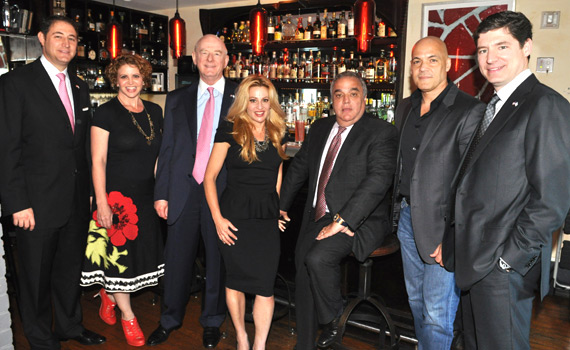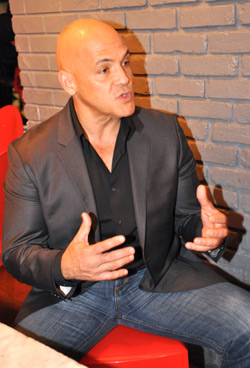Brett Graff’s Mixed Company
Tony Hernandez


Brett Graff’s MIXED COMPANY: SHOTS OF INSPIRATION FROM MIAMI’S BUSINESS LEADERS is a series of interviews with internationally recognized executives. In its second season, this one titled THE BUSINESS OF LEISURE, the column will over three months reveal how five high-level figures created extraordinary careers by either captivating us during our free time or using their own to accomplish steadfast professional goals.
Brett Graff is an award-winning journalist and a former U.S. government economist who under her trademark The Home Economist contributes to The Miami Herald, USA Today, Fox Business News, Yahoo! Finance, Maxim and more. She has appeared on CNBC, CNN, PBS and Headline News in addition to being frequently quoted by outlets including Los Angeles Times, Cosmopolitan, The New York Times, and Wikipedia. She lives on Key Biscayne with her husband and daughters. Visit www.thehomeeconomist.com to see her reporting.

Tony Hernandez, founder and CEO of Latino Broadcasting Company, has been delivering news and information to television’s Hispanic markets since 1996. But thanks to his most recent production – the Immigrant Archive Project –Hernandez himself wound up the recipient of some important facts: those about his own family’s journey from Cuba to America.
“My maternal grandparents escaped in the night with 33 people in a 28-foot boat,” says Hernandez. “But they never spoke about what they endured on that journey. Whenever we’d ask, they’d change the subject.”
But once Hernandez began recording and producing the plights and triumphs, the fears and perseverance of immigrants who were determined to live in America, he found many of them willing to discuss the topic. One woman from Connecticut, to whom Hernandez shipped expensive digital recording equipment, captured the story of her parents – plus a whole lot more.
“When I played the cassettes I was floored,” says Hernandez. “In the middle of the interview I learned that the person who organized their trip was my grandfather. I learned so much from their stories. That was my first signal that this project was the right thing to do.”
Since then, those positive signs have become increasingly obvious. The Immigrant Archive Project was featured on Fox News, Latino and shortly afterward, NBC Latino put Hernandez on its list of “Top Ten Twitter Feeds That Matter.”
We sat down with Hernandez at Sra. Martinez in the Design District and learned about how to produce our own life stories in order to make the journey more captivating.
You have some big corporate names involved – which we know is critical for funding creative projects — how much of your vision did you have to sacrifice in exchange for cash?
In this case, none. Sure, all creative projects need a sponsor and our other programs — such as our TOP 20 LATIN URBAN COUNTDOWN and CONTEO VENTES — are pretty commercial. So it’s easy to do something like a “Coca-Cola Hit of the Week.”
But for a project like this people are baring their souls and I said, “I don’t want this to look like NASCAR — we can’t have 10,000 logos.” So for the first couple of years, we sponsored it ourselves.
A year into it, a major company approached us with an offer to buy the project — presenting us with enormous funding numbers. But their plans were to turn the entire production into a story about how the company itself managed to enhance the lives of immigrants. And I said, “No. My mother’s story is in this. You can’t put a price on that.”
Who else’s stories are inside?
Edward James Olmos — an actor whose work in STAND AND DELIVER got him nominated for an Academy Award — heard about the project and wanted to become involved, having since become a bit of a spokesperson. And while we’ve interviewed AT&T CEO Ralph De La Vega and Miami Dade Community College president Eduardo Padron, we didn’t create a “Lifestyles of the Rich and Famous.” For every university president, we have a single mom or a blue collar worker or a homeless person. The youngest of them is 8-years old and the oldest 108. There’s 100 years of history within the pages of the project.
How do you get people to reveal experiences so personal?
The trick is to develop a genuine rapport with each person. We do that during a pre-interview after which, we develop questions to guide the interview, but not to use as a script. Rather, we follow the person’s story. Then there’s the interview, of course, which we follow up with a Thank You note and a DVD copy of the edited footage.
How can we all – when speaking – alleviate the fear of sounding foolish?
What I found – and it’s a point I hammer across to my sales people — is the only time you feel nervous in front of a crowd is when you’re not sure about the subject matter. Preparation will ensure you know your topic – and preparation will give people a reason to listen to what you’re saying.
What’s the one thing you’d want us to know about immigrants?
There are some extremely draconian laws proposed designed to make life for the undocumented immigrant difficult. But we’re a country of immigrants; we’ve always been a country of immigrants.
Immigrants are looking for opportunities better than what they had in their countries. Think of it like an ecological system that attracts butterflies. When the balance is off, there are no butterflies. The day we don’t have people coming here is the day we’re in trouble.
What’s some good advice you’ve gotten?
Well one lesson I’ve kept with me forever came from my dad. We arrived from Cuba when I was five years old and we were living in a horrible New Jersey neighborhood. Our tiny apartment shared a bathroom with the one next door, in which lived an alcoholic. My father worked two full-time jobs, seven days a week, and one afternoon came home to change his clothes. He said to me, “Hey Tony, do you understand how lucky your father is? Most guys get one paycheck a week, but I get two.” My father has a third grade education. And what allowed him to become successful in this country — to educate his children and retire comfortably — was his positive attitude. When things get hairy, I think back to that moment. And it gives me a lot of strength.


Brett Graff is SocialMiami.com’s managing editor and has been a journalist covering money, people and power for over 20 years. Graff contributes to national media outlets including Reuters, Glamour, Harper’s Bazaar, Maxim, and the PBS show, Nightly Business Report. A former U.S. government economist, her nationally syndicated column The Home Economist is first published in The Miami Herald and then on the Tribune Content Agency, where it’s available to over 400 publications nationwide. She is broadcast weekly on two iHeartRadio news shows and is the author of “Not Buying It: Stop Overspending & Start Raising Happier, Healthier, More Successful Kids,” a parenting guide for people who might be tempted to buy their children the very obstacles they’re trying to avoid.


